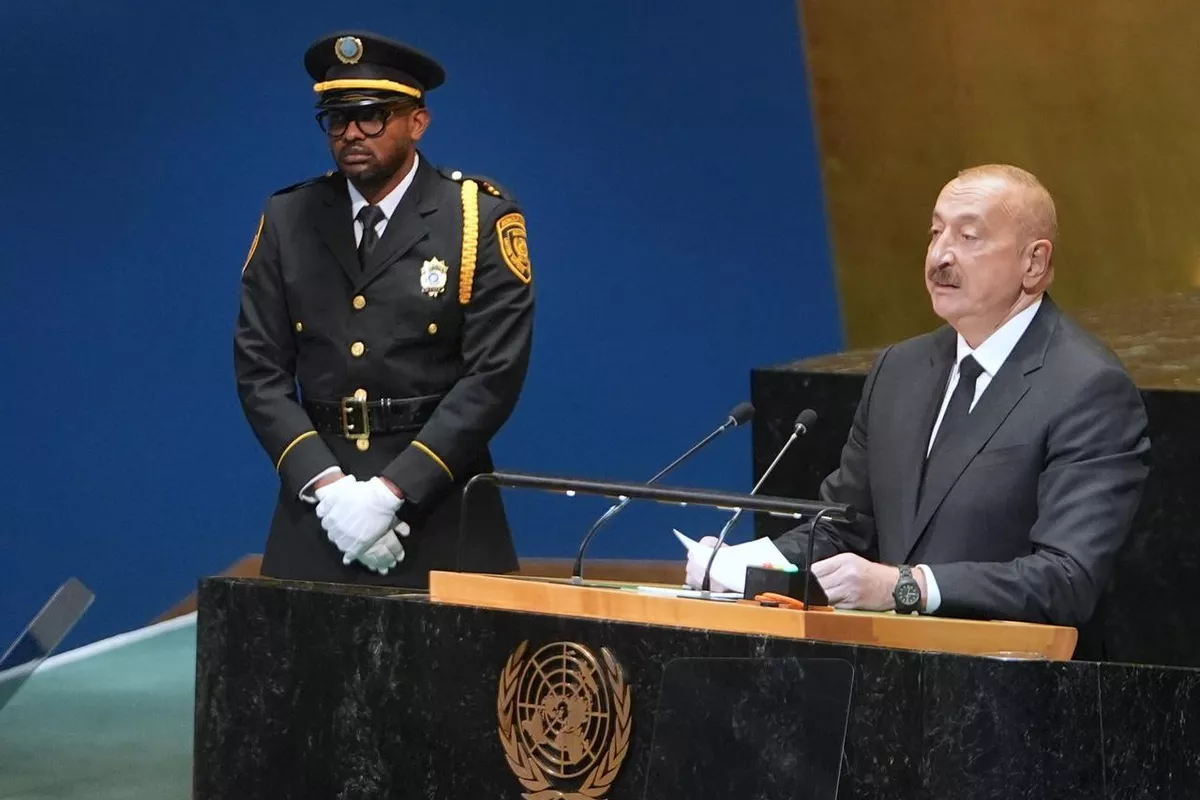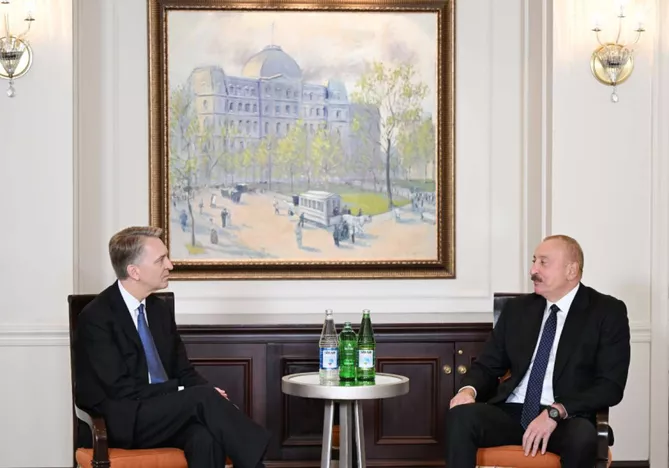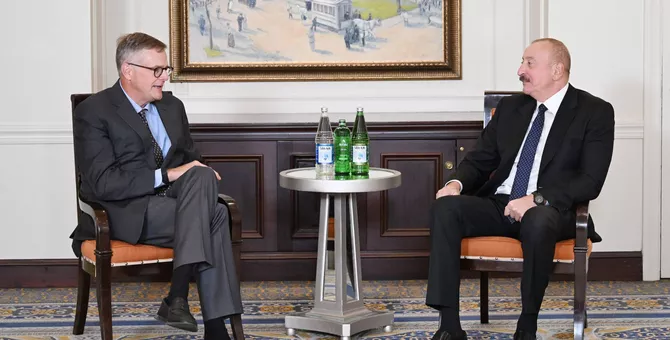
photo: Türkiye Today
When President Ilham Aliyev arrived in New York to attend the 80th session of the United Nations General Assembly, it was more than a routine diplomatic mission. His visit became a powerful demonstration of Azerbaijan’s emergence as a confident and strategic global player, shaping not only its own future but also influencing the contours of international politics and economics. In a world marked by fierce competition for resources, investment, and influence, Baku’s message to the world was clear: Azerbaijan is no longer a peripheral actor, but a country setting new rules for engagement.
What makes this visit particularly striking is the nature of the meetings that took place on the sidelines of the UN gathering. Every key encounter President Aliyev held-whether with the heads of leading corporations, global investment giants, or fellow world leaders-was initiated by the other side. This reversal of roles is rare in modern diplomacy. At a time when many nations actively campaign to attract capital and attention, Azerbaijan has become the magnet. The country’s leader is no longer simply invited to the table; others are lining up to secure a place at Azerbaijan’s table.

photo: Sharq qapisi
Among the most notable meetings were those with Bruce Flatt, CEO of Brookfield Asset Management; George Walker, Chairman of Neuberger Berman; and Jonathan Gray, President of Blackstone. These are not just companies-they are titans of the global financial system. Brookfield oversees assets worth trillions, Blackstone is the undisputed leader in alternative investments, and Neuberger Berman holds strategic sway over international financial markets. Their decision to engage directly with Azerbaijan, and to seek out these discussions themselves, is a signal of profound importance. It reflects a shared perception that Azerbaijan’s investment climate is stable, its reforms are credible, and its long-term prospects are not just promising but uniquely advantageous.
One subtle yet crucial point emerged during these negotiations: the growing trust built through years of collaboration with Azerbaijan’s sovereign wealth vehicle, the State Oil Fund of Azerbaijan (SOFAZ). This trust has now become the foundation for expanding partnerships into new sectors, from renewable energy to advanced technologies. In an era when markets are volatile and predictions are constantly overturned, Azerbaijan represents a rare island of stability. For these global investors, the calculus goes beyond profit. It is about placing a bet on a country that offers reliability and resilience at a time when both are in dangerously short supply.
But to view Aliyev’s visit merely through the lens of economics would be to miss the bigger picture. Today, economics and diplomacy are deeply intertwined, and Azerbaijan has mastered the art of using economic engagement as a sophisticated tool of influence. When Baku discusses major projects with international corporations, it is sending a broader political message: Azerbaijan is not seeking to be a passive participant at the edges of the global economy. It is positioning itself as a hub where East meets West, a central node in the world’s supply chains and value networks.
This approach embodies a new diplomatic philosophy. In a world riven by conflict and fragmentation, Azerbaijan offers a pragmatic language of mutual benefit. Its strategy is neither ideological nor utopian. Instead, it is grounded in the understanding that cooperation built on shared economic interests can create a far more durable foundation for peace and stability than political declarations alone.
The context of this visit makes its significance even clearer. Every year, the UN General Assembly brings together leaders from across the globe, resulting in countless side meetings and bilateral sessions. Yet the unique feature of Azerbaijan’s engagements in New York was that they were driven by external demand. International partners actively sought out Azerbaijani leadership. This is not just a diplomatic courtesy; it is a recognition of Azerbaijan’s rising stature. The country has demonstrated its ability to restore its territorial integrity and sovereignty, to enhance Europe’s energy security, and to offer a credible model for sustainable development in a turbulent region.
Today, Azerbaijan is far more than an oil exporter. For the West, it has become a strategic bridge-a nation capable of balancing the ambitions of global powers while offering practical solutions to some of the world’s most pressing challenges. This gives its economic dialogue a dual function. It is not only about trade or investment; it is also a subtle form of geopolitical planning. Decisions made in Baku now resonate across continents, shaping the energy, technological, and political architecture of the future.

photo: President.az
Aliyev’s visit to the United States also highlights another critical dimension: Azerbaijan is now seen internationally as a country with a predictable business environment, modernized legal frameworks, and diversified financial tools. These are not superficial reforms but deep structural changes that have reshaped the nation’s image. Azerbaijan is now regarded as a reliable partner-a place where long-term agreements can be forged with confidence.
This is why companies like Brookfield, Neuberger Berman, and Blackstone are turning their attention to Azerbaijan. They recognize that engaging with Baku is not just a financial opportunity but a strategic move. By investing in Azerbaijan, they secure a foothold in a rapidly evolving global order where energy transition, digital transformation, and geopolitical realignment intersect. In other words, they are betting on Azerbaijan as a gateway to tomorrow’s world.
The symbolism of this moment cannot be overstated. Aliyev’s meetings in New York were not simply bilateral discussions; they were a public acknowledgment that Azerbaijan has crossed a threshold. It is no longer a country waiting for invitations to join global initiatives. It is now a destination in its own right, a place others actively seek out to build partnerships and shape strategies.
For decades, small and medium-sized nations have been viewed as arenas where great powers compete, often without agency of their own. Azerbaijan is rewriting that script. Through a blend of strategic diplomacy, economic innovation, and bold leadership, it has transformed itself into a subject-not an object-of international relations. This is a profound achievement in today’s fractured world.
As the 80th session of the UN General Assembly concludes, one thing is certain: Azerbaijan’s voice is growing louder on the world stage. Its model of pragmatic engagement, rooted in stability and mutual gain, offers a refreshing alternative to the zero-sum rivalries that dominate global headlines. President Aliyev’s New York visit was not just another stop on the diplomatic circuit. It was a milestone, a statement of intent, and a glimpse into a future where Azerbaijan plays a central role in shaping the world’s political and economic landscape.
In the end, the message from New York is clear. Azerbaijan has moved beyond being a bridge between East and West. It is becoming a pillar of the global system itself-a place where the future is not only imagined but actively built.
Share on social media